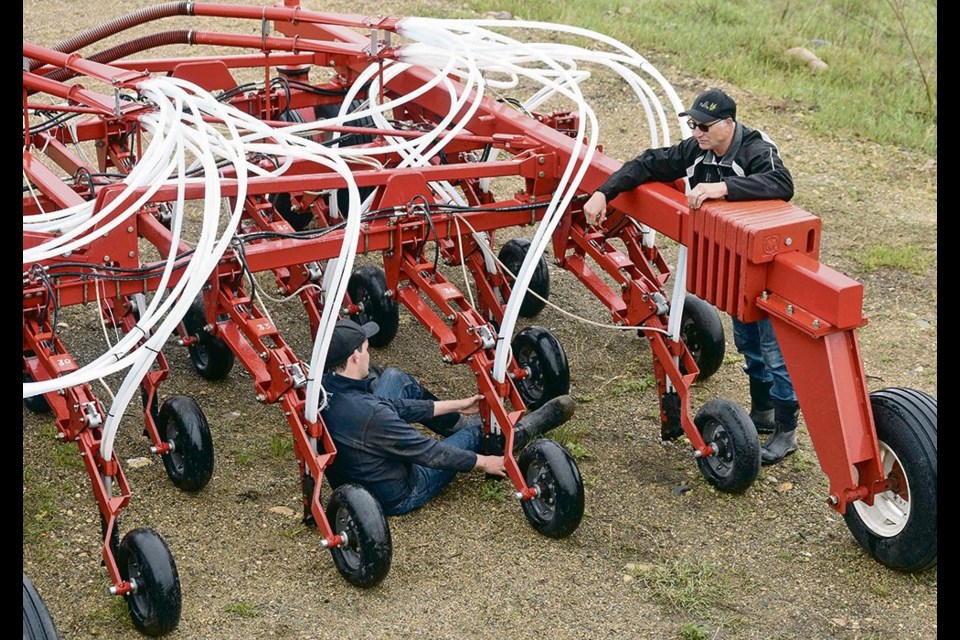SPY HILL, Sask. — History has been repeating itself at the Decorby farm for 140 years.
Generations of Decorbys have tilled and planted the rich heavy loam soils that line the Qu’Appelle River Valley southeast of Spy Hill, Sask., not far from where Fort Esperance, a North West Company’s fur trading and pemmican depot used to stand in the 1700 and 1800s.
Like his father, grandfather and great-grandfather before him, Jean Decorby would have it no other way.
“We love what we do and that’s important as a multigeneration farm because we’re not big. We’re a small farm and we’ve managed to go through this into five generations,” he said.
In 1867, the year of Canadian confederation, Father Jules Decorby arrived from Chandolas in southern France to pioneer several school missions.
In 1881, he homesteaded a quarter of land in preparation for his brother, Joseph Benjamin Decorby (Jean’s great grandfather), who arrived in 1883 with his wife and child. They continued to carve out their new life in the fertile valley, which is dotted with clear running springs that have been flowing and nurturing life for eons.
“It reminded them of back home and of where they came from,” said Jean DeCorby, as he sat at the kitchen table with his wife, Cathy, and two sons, Jocelyn, 20, and Jean Luke, 18. The couple also have three daughters: Ivy, Chantelle and Guylaine.
Married since 1994, Jean and Cathy are both fourth generation farmers who met at school nearby in Rocanville.
While he was tempted by better paying jobs, Jean knew farming was the life for him.
“As a kid I grew up working on the farm and never really left. You are your own boss and can decide what you’re going to do, how long you’re going to do it and when you’re going to do it,” he said.
“It’s a lifestyle and a great place to raise a family. You teach your kids work ethics and you learn yourself. There’s always something new to learn on the farm.
“When you’ve grown a good crop it’s you. It’s what you’ve done, it’s your accomplishments and if you want to expand, it’s very rewarding that way.”
Cathy said there are challenges, however.
“Farming actually stresses me out a little more than some. It’s just the uncertainty of farming. Like Jean said, you get up in the morning and you don’t actually know. I guess the worst part is the amount of money it takes to get that crop and then if you don’t get it, there’s obligations. I’m the bookkeeper.”
The family farms 3,000 acres planted to oilseeds and coarse grains and rents out some pasture.
“All maintenance and a lot of the repairs we do ourselves, but there’s things we can’t handle, like computerized stuff,” Jean said.
Jocelyn is now involved in the day-to-day farm work and committed to being the fifth generation to farm.
“I like being this next generation and will keep going with all the history that we have,” said Jocelyn.
However, the 20-year-old is beginning to recognize the responsibility of maintaining a multigenerational farm. It’s not easy to be the next generation, with pressure to succeed and continue the legacy.
“My biggest fear is having bad years and then having no money to work with and then losing it all,” he said.
Jean said discipline and integrity are the qualities he wants to instill in future generations of his family.
“I remember my mom and dad always saying, you make a commitment, you buy something, you honour it. … That’s what I’m trying to instill in Jocelyn,” he said.
The family keep Sundays free of work and attend church to acknowledge the role of God in their working lives.
Jean sees the land as more than a workplace.
“We’re actually stewards of nature and of the land. We take care of it to the best of our knowledge and ability.
“And that’s where generations come in. If I take good care of it, then Jocelyn’s got something to take on and take good care of. And that’s why I think we’re at the fifth generation on this farm,” said Jean.
“Jocelyn’s going to have challenges when he gets going because maybe 3,000 acres is not going to be considered a farm anymore. So, his challenge is, do I get bigger, and when can I do it because it’s tough to buy land now.”
Jean has visions of a legacy stretching through the years.
“I won’t see it but I’d love a 10-generation farm. That would be something,” he said.
“So far we’ve done all right but next year can be different and 10 years can be totally different, like from when my dad started farming or when I was helping my dad, it’s a totally different farm now,” said Jean.
“It was an honour to farm with my dad and to have my wife’s dad help me too. I learned a lot from them and it was an honour to farm with somebody that taught me.”




